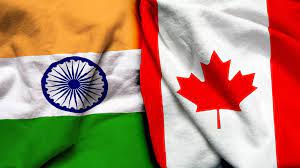Table of Contents
Escalating Accusations and Counterclaims
On Thursday, the spokesperson of the Ministry Of External Affairs (MEA)- Randhir Jaiswal made a statement rejecting the previous allegations made by the Canadian Government about India interfering in their electoral processes. Jaiswal turned the tables, instead claiming that it was Canada that meddled with the internal affairs of India. The ordeal marks a significant impression on the already tense relations between the two countries.
The top foreign intelligence agency of Canada pointed fingers at India, alleging it for tampering with the elections and dubbed it as a “foreign interference threat”. The report curated by the intelligence agency posited that the interference has had detrimental and inimical ramifications for the cogent democratic nature of the Canadian elections.
Preceding India, China and Russia were met with the same accusation. China was referred to as the ‘most significant threat’, on the precipice of disturbing the equilibrium of the government and civil societies all over the country. Following the findings of the declassified report, Canadian Prime Minister Justin Treadeau Trudeau ordered an inquiry into the matter in hand.
Jaiswal shoots down the claims by calling them ‘baseless’ and stating that it is not in the core spirit of India’s policy to meddle into the sovereign affairs of another state. He went ahead to call Canada out for its nonchalance on taking effective measures to address the issues continually raised by India pertaining to its concerns about Canadian interference.

Diplomatic Tensions between Canada and India
The ordeal has contributed to exacerbating the already budding tensions between Canada and India when Trudeau’s September 2023 accusations suggested Indian involvement in the killing of Khalistani terrorist Hardeep Singh Nijjar in British Columbia. The incident underscored deep-seated distrust and strained diplomatic ties.
India’s External Affairs Minister, S Jaishankar, delivered a scathing response to Canada’s accusations of election interference, likening it to “the pot calling the kettle black.” In his sharp retort, Jaishankar articulated, “I was struck by a Hindi phrase: ‘Ulta chor kotwal ko daantey’ (the pot calling the kettle black).”
His choice of words emphasized India’s stance on the matter, highlighting the irony of Canada’s allegations against a backdrop of its own questionable actions. The minister’s remarks underscored India’s firm rejection of Canada’s claims, while also subtly rebuking the perceived hypocrisy in the accusations.
The deterioration of India-Canada relations led to New Delhi suspending visa issuance to Canadians, reflecting the depth of strained ties. However, in November, visa issuance was reinstated, signaling a potential thaw. India sought diplomatic parity, compelling Canada to withdraw 41 diplomats in October.
Reports indicate that the recent actions were instigated by Jagmeet Singh, a prominent figure within the New Democratic Party, a coalition partner of Trudeau. Singh has faced allegations of influencing Trudeau’s stance on Khalistan, adding another layer of complexity to the already strained India-Canada relations.

The gathering of documents by the Foreign Interference Commission preceded the inaugural round of public hearings, aimed at assessing the potential disclosure of classified national security information. Key figures, including top officials from the Canadian Security Intelligence Service (CSIS), Signals Intelligence, the National Security Advisor’s office, and Intelligence Advisor Dan Rogers, provided testimony.
The Canadian Government established the Foreign Interference Commission shortly before Prime Minister Trudeau’s departure to India for the G20 summit. During this summit, Trudeau purportedly raised concerns with Prime Minister Narendra Modi regarding allegations of Indian interference in the June 2023 murder of Khalistani terrorist Hardeep Singh Nijjar in British Columbia.
Conclusion
In conclusion, the recent exchange of accusations between India and Canada has unveiled a deeper layer of complexity in their diplomatic relationship. The rejection by India’s Ministry Of External Affairs of Canada’s claims of interference, coupled with Canada’s own allegations, underscores the fragility of trust between the two nations. This strained relationship, exacerbated by recent events and historical tensions, necessitates careful diplomatic navigation and earnest dialogue to mend ties and foster mutual understanding.
As both countries grapple with the fallout of these allegations and the wider implications for their bilateral relations, the path forward requires a commitment to transparency, respect for sovereignty, and a willingness to address underlying grievances. Only through sincere efforts towards reconciliation and cooperation can India and Canada hope to overcome their differences and build a stronger, more resilient partnership for the future.



